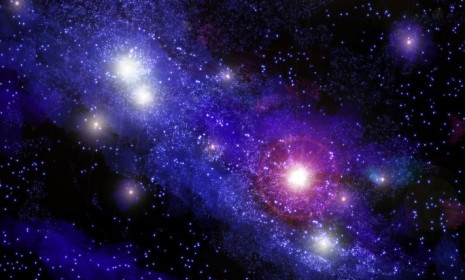Dark energy: The mysterious force causing the universe to expand
Scientists confirm with 99.996 percent certainty the existence of a little-understood substance that is "one of the great scientific mysteries of our time"

A free daily email with the biggest news stories of the day – and the best features from TheWeek.com
You are now subscribed
Your newsletter sign-up was successful
Physicists have long understood very little about dark energy, a mysterious substance thought to be stretching out the cosmos. But thanks to a new two-year study from researchers in Germany and the U.K., we can at least confirm scientists' longstanding dark-energy theories with 99.996 percent certainty. But what is this stuff, exactly? Here, a handy guide:
First things first: What is the universe made of?
"Our universe is a mysterious place," says Jennifer Ouellette at Discovery News. Roughly 4 percent of it is made of ordinary matter like stars and planets. The rest, according to physicists, is a combination of mysterious dark matter — which functions as an invisible glue that holds the universe together — and an even lesser-understood substance call dark energy, which is "causing the cosmos to expand at an accelerating rate."
The Week
Escape your echo chamber. Get the facts behind the news, plus analysis from multiple perspectives.

Sign up for The Week's Free Newsletters
From our morning news briefing to a weekly Good News Newsletter, get the best of The Week delivered directly to your inbox.
From our morning news briefing to a weekly Good News Newsletter, get the best of The Week delivered directly to your inbox.
Hold on. What exactly is dark energy?
Scientists aren't sure, but they have a few ideas. According to NASA, dark energy could be a "property of space" that helps create more space. Another possibility: Dark energy is an energy fluid or field that "fills all of space," but has the opposite properties of matter. Yes, it's confusing. And the truth is, scientists still don't know what dark energy is — only that it exists. Dark energy is now believed to make up 73 percent of the universe.
How was dark energy discovered?
When Albert Einstein was working on his theory of relativity, "the math didn't add up," says Ouellette. According to his calculations, the universe wasn't a static size as he'd assumed — it was actually expanding. To account for this curveball, Einstein invented a mathematical trick to balance the equations, something he called the "cosmological constant," which serves as a placeholder for what's essentially empty space. Years later, astronomer Edwin Hubble confirmed the cosmological constant with his own observations, and astronomers in the late 20th century corroborated the theory with even more evidence that the universe was growing.
A free daily email with the biggest news stories of the day – and the best features from TheWeek.com
And dark energy makes the universe grow at a faster rate?
Yes. Most astronomers used to assume that the universe's expansion would eventually begin slowing down, or that the universe would even begin shrinking, because of another well-known force: Gravity. In 1998, however, two separate teams of researchers — who went on to win the Nobel Prize in physics — found that the universe's expansion was actually speeding up. Their theory: That a unique force, dark energy, was outperforming gravity's pull and making the universe expand faster and faster.
So... what did this new study prove?
Researchers looked at the distance between two galaxies and measured cosmic microwave background radiation, or CMB, which ripples as the two galaxies grow farther and farther apart. Researchers spent two years analyzing the data, and found that the two galaxies were indeed separating. Their conclusion? There's a 99.996 chance dark energy is real. Of course, skeptics say the work is very preliminary, and much more research will be needed to confirm that dark energy actually exists. "Dark energy is one of the great scientific mysteries of our time," says researcher Bob Nichol from the University of Portsmouth, "so it isn't surprising that so many researchers question its existence."
Sources: Discovery News, LiveScience, NASA, Reuters
-
 The Week Unwrapped: Do the Freemasons have too much sway in the police force?
The Week Unwrapped: Do the Freemasons have too much sway in the police force?Podcast Plus, what does the growing popularity of prediction markets mean for the future? And why are UK film and TV workers struggling?
-
 Properties of the week: pretty thatched cottages
Properties of the week: pretty thatched cottagesThe Week Recommends Featuring homes in West Sussex, Dorset and Suffolk
-
 The week’s best photos
The week’s best photosIn Pictures An explosive meal, a carnival of joy, and more